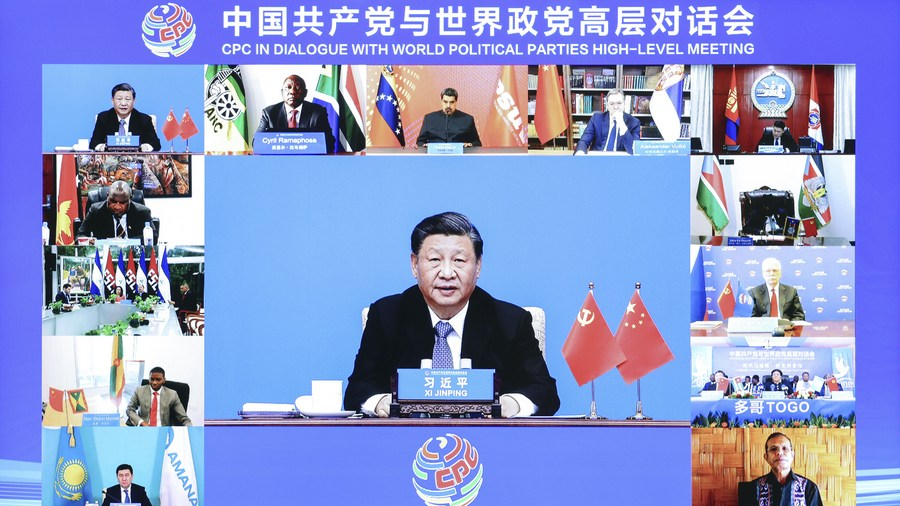
Xi Jinping, general secretary of the CPC Central Committee and Chinese president, attends the opening ceremony of the CPC in Dialogue with World Political Parties High-Level Meeting via video link in Beijing, capital of China, March 15, 2023. /Xinhua
Xi Jinping, general secretary of the CPC Central Committee and Chinese president, attends the opening ceremony of the CPC in Dialogue with World Political Parties High-Level Meeting via video link in Beijing, capital of China, March 15, 2023. /Xinhua
Editor's note: Imran Khalid is a freelance columnist on international affairs. The article reflects the author's opinions and not necessarily the views of CGTN.
During the opening ceremony of the CPC in Dialogue with World Political Parties High-Level Meeting on March 15, Xi Jinping, the general secretary of the Communist Party of China (CPC) Central Committee and Chinese president, put forth the Global Civilization Initiative (GCI), marking China's third significant global initiative, following the Global Development Initiative (GDI) and the Global Security Initiative (GSI). This initiative serves as a vital public asset that China offers to the world. The unending clash of civilizations, where they are trying not only to outcompete but also annihilate others, is the most unsettling element that has disturbed the peace and stability on this planet for centuries.
The GCI proposes four key elements, including the promotion of respect for diversity among civilizations, advocacy for shared values among humanity, recognition of the significance of both preserving and innovating civilizations, and encouragement for strong international cooperation and exchanges between people. This initiative encompasses essential concepts and principles that enable diverse civilizations to coexist harmoniously, offering both motivation and a practical roadmap towards its realization.
The Global Civilization Initiative, in line with the previous two forward-looking initiatives on security and development, represents a highly constructive, practical and sustainable major undertaking. The world is facing grave challenges, unprecedented in recent history such as the fear of pandemic outbreaks, the threat of war and conflicts, and the impacts of climate change, all of which are seriously intimidating global progress and international security. However, to face such imminent challenges, President Xi Jinping has put forward these initiatives as well as the concept of building a community with a shared future for mankind.
These initiatives appear to be addressing three different aspects of the global power fabric, but a deep appraisal of these initiatives would reveal that they are interconnected with each other and are pursuing progress, peace and development as a constant theme. The idea of a shared future for mankind continues to resonate within these paramount strategic pillars of Xi's new vision for the next decades.

The GSI, the GDI and the GCI work hand in hand to reinforce and complement each other, symbolizing the importance of harmony and interconnectedness. These three initiatives represent China's contribution to the world as a global public good and offer solutions to the challenges of our era. They embody the vision of creating a world community with shared goals and interests.
Xi's collective vision is that as a global community, mankind cannot be separated, and each country must prioritize the essential needs for development, security and diversity among communities, regardless of national or international changes. Xi's vision is rooted in the pursuit of peace and harmony. The launch of the three initiatives reflects China's commitment to morality and its crucial role in shaping the world today.
These initiatives provide valuable guidance and direction for addressing the development deficit and multifaceted challenges faced by the global community. The proposed initiatives align with the global need for recovery in the aftermath of the pandemic, given rising inflation and crises in areas such as trade, energy and food security. Xi's vision of a shared future, which emphasizes understanding and shared institution-building, differs fundamentally from the prevailing American idea of building a future through competition.
China's vision, which is primarily based on its traditional cultural values, particularly the principles of harmony and equality, emphasizes that if one country focuses solely on its own success while its neighbors are left behind, this imbalance could lead to conflicts that ultimately harm all the stakeholders.
The GDI emphasizes inclusiveness, with a particular focus on addressing the unique needs of developing countries and resolving issues of unequal and insufficient development both within and among nations. Meanwhile, the GSI upholds the principles of respect for national sovereignty, territorial integrity, non-interference in internal affairs, and the right of all countries to independently choose their development paths and social institutions. As it promotes respect for diverse civilizations and acknowledges their rights to development, the GCI responds effectively to the pressing needs of the international community. The three initiatives offer effective solutions to reduce the burden of conflicts and germinate the seeds of coexistence and a shared future for mankind.
(If you want to contribute and have specific expertise, please contact us at opinions@cgtn.com. Follow @thouse_opinions on Twitter to discover the latest commentaries in the CGTN Opinion Section.)